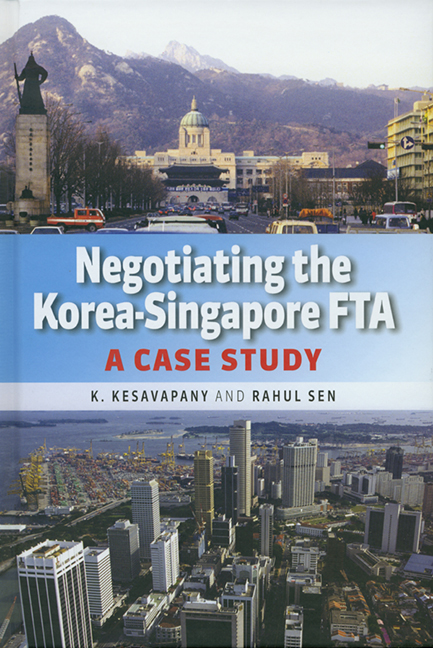Book contents
- Frontmatter
- Contents
- Foreword
- Preface
- 1 Background to the Korea-Singapore FTA
- 2 Singapore and Korea: Expanding Economic Linkages
- 3 Korea-Singapore Economic Relations After FTA: Towards a Mature Partnership
- 4 Salient Features of the KSFTA and Expected Benefits for Singapore
- 5 Singapore-Korea Business Linkages Post-KSFTA and Implementation
- 6 Concluding Remarks
- Notes
- References
- Appendix The Free Trade Agreement Between Korea and Singapore
2 - Singapore and Korea: Expanding Economic Linkages
Published online by Cambridge University Press: 21 October 2015
- Frontmatter
- Contents
- Foreword
- Preface
- 1 Background to the Korea-Singapore FTA
- 2 Singapore and Korea: Expanding Economic Linkages
- 3 Korea-Singapore Economic Relations After FTA: Towards a Mature Partnership
- 4 Salient Features of the KSFTA and Expected Benefits for Singapore
- 5 Singapore-Korea Business Linkages Post-KSFTA and Implementation
- 6 Concluding Remarks
- Notes
- References
- Appendix The Free Trade Agreement Between Korea and Singapore
Summary
INTRODUCTION
Historically, Korea and Singapore have enjoyed strong political relations, with both countries sharing the same strategic outlook on a variety of regional and international issues. The leaders of both countries have regularly held bilateral meetings at the margins of international fora, such as the World Trade Organisation (WTO) and the Asia Pacific Economic Cooperation (APEC) to exchange views on regional developments. Both countries have recognized the view that economic integration in the region is vital for enhanced competitiveness. In the above context, this chapter focuses on the current state of economic relations between Singapore and Korea, focusing on merchandise trade, trade in services and on investment flows between the two countries, in order to emphasize the economic rationale behind the KSFTA.
MERCHANDISE TRADE
Korea and Singapore have enjoyed strong economic linkages that have been driven by strong complementarities between both economies. In 2006, with total trade amounting to S$30 billion (about US$11 billion), Korea was Singapore's 9th largest trading partner (Tables 2.1 and 2.2), while Singapore was Korea's largest trading partner among the ASEAN countries, and overall the 10th largest trading partner of Korea. Over the 1993–2003, the volume of Singapore-Korea merchandise trade more than doubled at a compound rate of 9.5 per cent per annum. However, this growth was even more rapid at a compound annual average rate of 16.7 per cent over 2003–06.
- Type
- Chapter
- Information
- Negotiating the Korea-Singapore FTAA Case Study, pp. 5 - 12Publisher: ISEAS–Yusof Ishak InstitutePrint publication year: 2007



